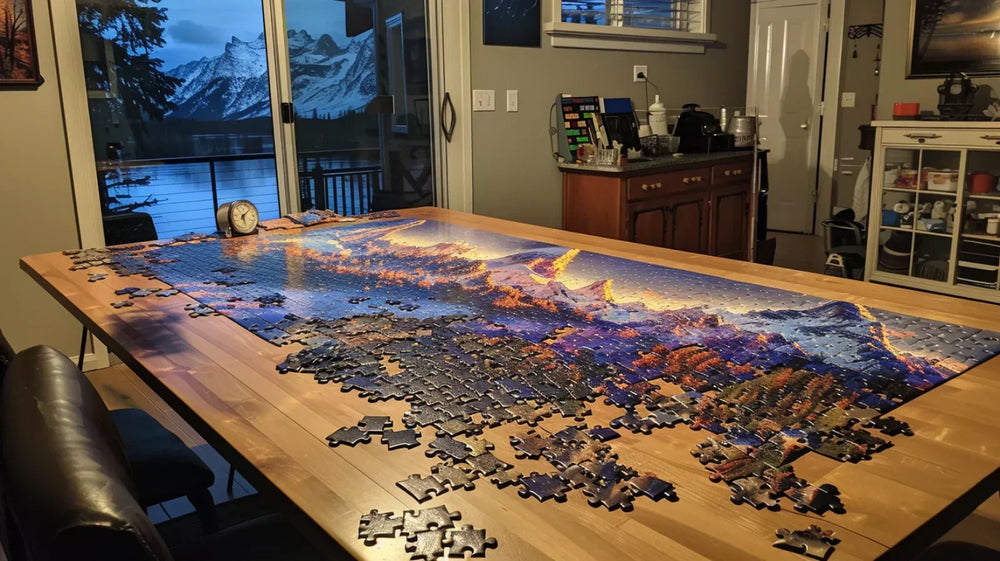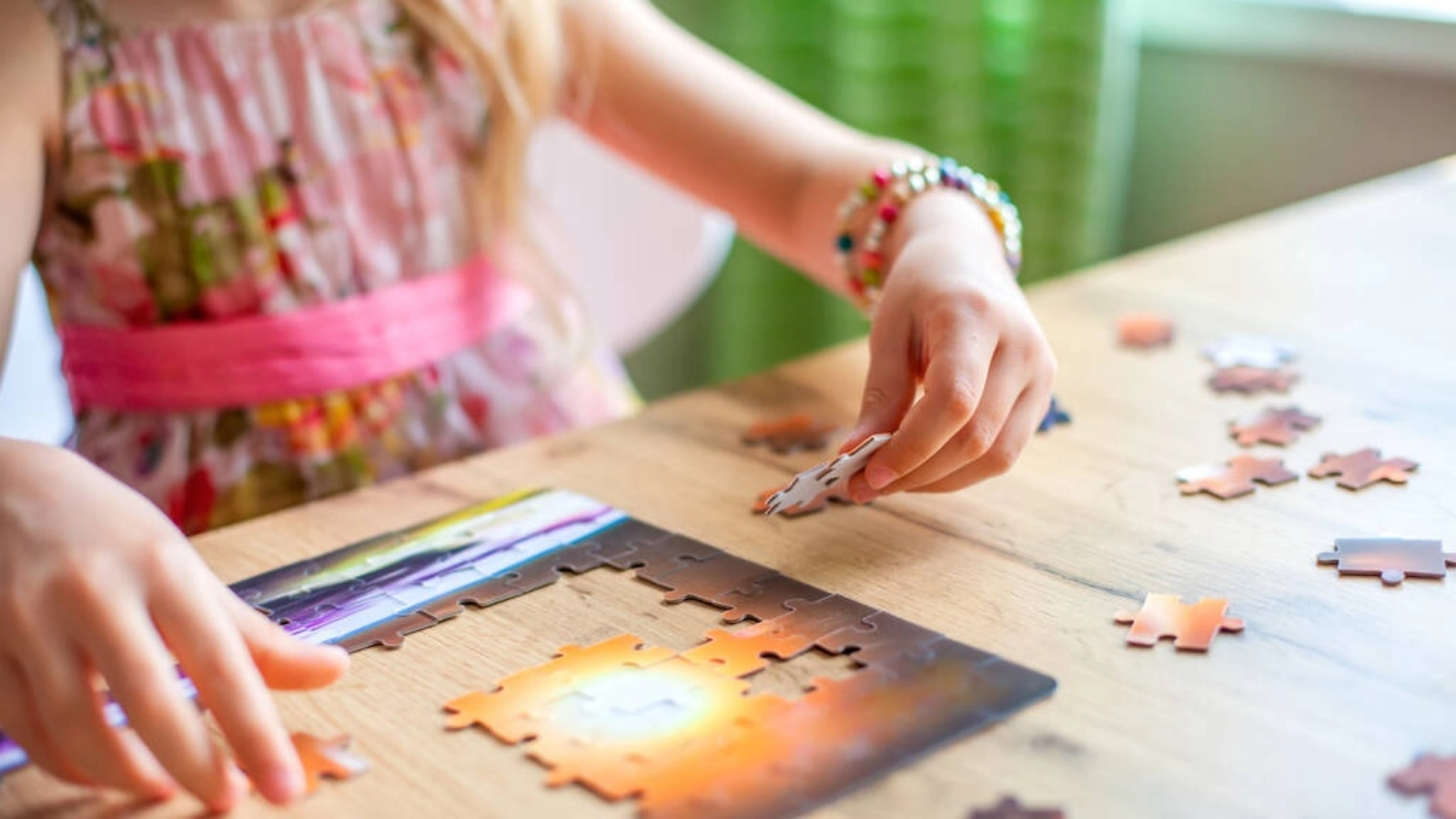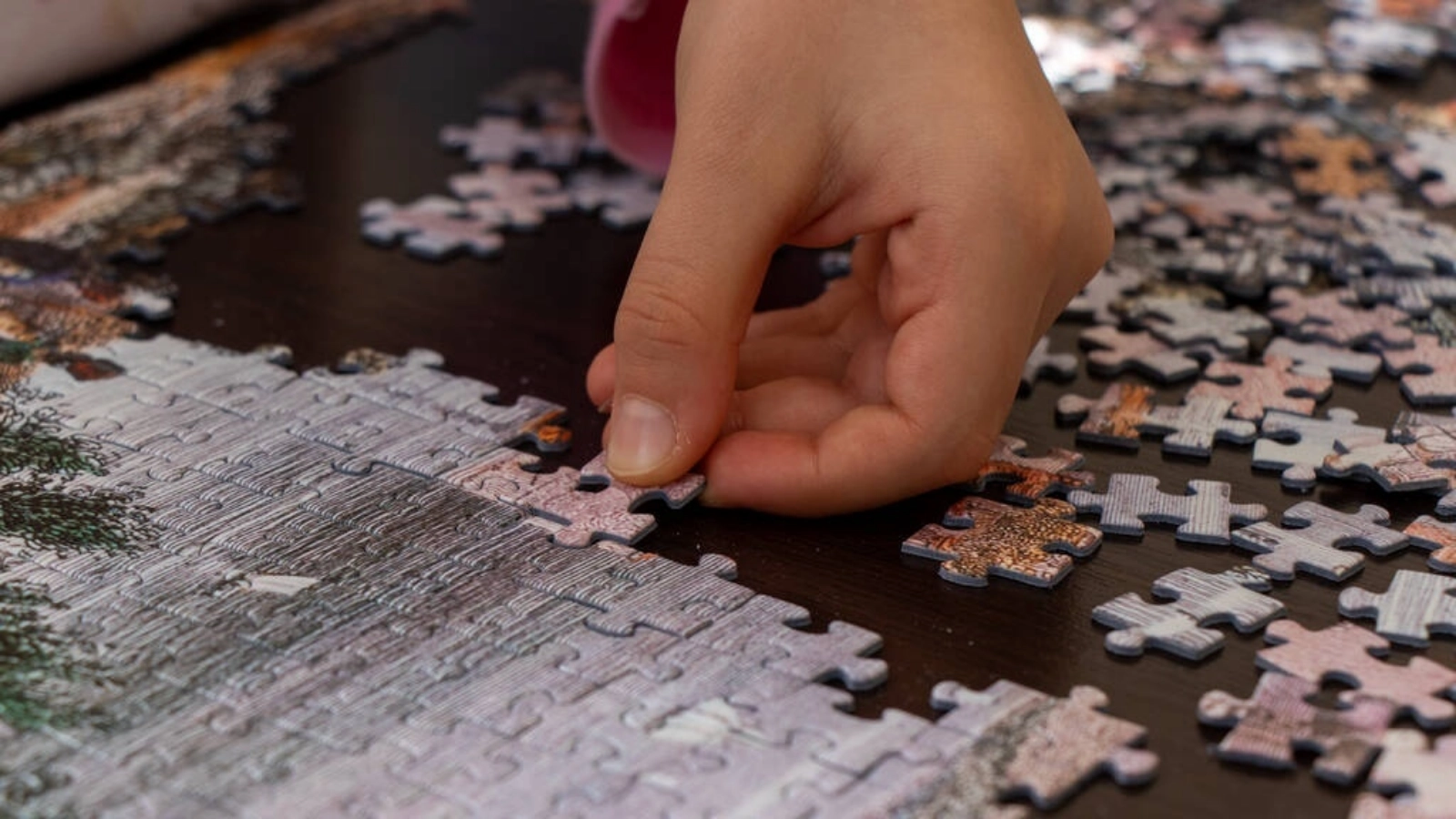
When working on a 1000-piece puzzle, the time it takes to finish can vary. How long it takes depends on how experienced you are, how you sort the pieces, and where you work.
Beginners might take up to 30 hours, while experts can finish in about 7 hours. These differences make us think about the best ways to assemble puzzles efficiently.
Key Takeaways
- A 1000-piece puzzle typically takes beginners 10-30 hours to complete. But experienced puzzlers can finish in 4-6 hours.
- The average completion time for intermediate puzzlers ranges from 7-10 hours.
- Complex patterns, uniform colors, or subtle designs can extend the completion time to 20-40 hours.
- Working collaboratively with others can significantly reduce completion time.
Factors Influencing Completion Time

Unlike a 100 piece, 300 piece, or 500 piece puzzle, the time it takes to complete a 1000-piece one depends heavily on five key factors. Read on to figure out the factors.
Puzzle Complexity
The complexity of the puzzle image profoundly impacts your puzzle-solving process. Jigsaw puzzles with uniform colors and patterns take even more time.
Piece configuration plays a pivotal role, too. Simpler piece shapes accelerate assembly compared to intricate ones.
Experience Level
A puzzler's experience level dramatically influences the completion time. As a novice puzzle solver, you'll likely take 15-20 hours to finish your first challenges. But experienced puzzle enthusiasts can finish in 5-8 hours.
Your completion time will improve considerably with practice. Regular practice enhances pattern recognition and assembly strategies. Thus, you can accelerate your progression from novice to expert.
Time Availability
Time management affects how fast you finish a 1000-piece puzzle. More time for continuous puzzle work means faster completion. Long, uninterrupted sessions lead to more progress than short, scattered ones.
Set up a dedicated workspace for your puzzle so you don't have to keep setting it up and taking it down. To finish faster, make puzzle time a priority and stay focused during your sessions.
Environment
The place where you solve a puzzle affects how fast you finish, along with your schedule. You need good lighting to see different colors and shapes clearly. Having a set space keeps puzzle pieces organized and won't get in the way. A comfortable room temperature helps you focus for a long time.
To puzzle efficiently, use a clean, spacious surface that fits the whole puzzle. Think about noise and possible interruptions. Easy access to sorted pieces and a stable table help you find and place pieces quickly.
Methodology
Several methodological factors directly influence the time to complete a 1000-piece puzzle. The puzzle depends heavily on your sorting strategy and ability to maintain focus.
How you organize your work and focus on each part affects how long it takes to finish. Interruptions and your dedicated attention span also impact completion efficiency.
How Long Do 1000 Piece Puzzles Take?

How long does it take to complete a 1000 piece jigsaw puzzle? Let's explore the typical time frame by examining various contributing factors.
Beginners
Most beginners can expect to spend between 10 to 30 hours completing their first 1000-piece puzzle.
If you're new to puzzles, completing the puzzle might take several days or weeks. This is due to frequent breaks and distracted attention.
Intermediate
Intermediate puzzlers can knock out a 1000-piece puzzle in approximately 5-12 hours. Your efficiency increases as you develop pattern recognition and sorting strategies.
When doing a puzzle at this level, you can finish faster by sorting pieces by color and pattern. To make your 1000 piece puzzle go quicker, ask others to help. Working together usually makes it much faster.
Advanced
Advanced puzzlers can complete a 1000-piece jigsaw in 3-10 hours. However, the completion times vary based on image complexity and solving conditions. Completing complex puzzles with uniform patterns or subtle color variations can extend your solving time to 20-40 hours.
Average Time to Complete Different Puzzles
When comparing puzzle completion times across different piece counts, you'll find distinct time variations based on the puzzle's complexity.

Tips to Improve 1000-Piece Jigsaw Puzzle Solving Speed
Completing a jigsaw puzzle with 1000 pieces can be both challenging and rewarding. Here are some tips and tricks to help you improve your solving speed:
- Organize Your Workspace: Ensure you have a comfortable and well-lit area to spread out the puzzle. A dedicated puzzle table can be beneficial.
- Sort the Pieces: Start by sorting the pieces by color, pattern, and edge pieces. This will make it easier to locate the pieces you need as you progress.
- Start with the Edges: Assemble the border of the puzzle first. This gives you a defined space to work within and helps with spatial orientation.
- Work on Small Sections: Focus on completing small sections of the puzzle at a time, especially areas with distinct colors or patterns.
- Use the Picture as a Reference: Keep the puzzle box cover nearby to reference the completed image. This will help you visualize where certain pieces might fit.
- Look for Unique Pieces: Identify and set aside pieces with standout colors or patterns, as they can often be placed more quickly.
- Stay Organized: Keep sorted piles neat, and periodically resort pieces if necessary to maintain organization.
- Rotate Pieces: Try rotating pieces to ensure they’re being looked at from all angles, as this can sometimes make placement clearer.
- Take Breaks: If you're stuck, take a short break. Returning with fresh eyes can often help you see things you missed.
- Practice Regularly: The more puzzles you do, the better you'll become at recognizing patterns and shapes quickly.
Conclusion
Completing a 1000-piece puzzle typically requires 7-40 hours, depending on your experience level and the puzzle's complexity.
Beginners may take longer completion times. But you can optimize your puzzle game by implementing systematic sorting methods, maintaining proper lighting, and creating an organized workspace.
Remember that factors like image patterns, piece shapes, and collaboration will directly impact your completion timeframe.
FAQs
How Long Should It Take One Person to Do a 1000-Piece Puzzle?
You'll typically spend 7-10 hours completing a 1000-piece puzzle solo, but it can extend to 20-40 hours for complex designs. Your experience level and solving approach will greatly impact completion time.
What Is the Fastest Time to Solve a 1000-Piece Puzzle?
You'll find that the world record for completing a 1000-piece puzzle stands at 6 minutes and 56 seconds, set by Kevin Leung in 2019, though this isn't representative of typical solving times.
What Is a Competitive Time for a 1000-Piece Puzzle?
You'll be considered competitive if you can complete a 1000-piece puzzle in 4-6 hours. This range demonstrates advanced skills, though it's still considerably slower than expert puzzlers who finish in under 3 hours.
Is It Hard to Do 1000 Puzzle Pieces?
You'll find 1000-piece puzzles challenging but manageable. They require strategic sorting, pattern recognition, and sustained focus. If you're a beginner, expect significant difficulty, but you'll improve with practice and proper techniques.